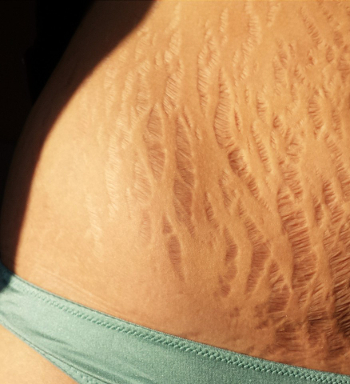Stretch mark study says salves unhelpful
 While there seems to be millions of ‘miracle’ treatments for stretch marks on the market, experts are only just finding out what the marks actually are.
While there seems to be millions of ‘miracle’ treatments for stretch marks on the market, experts are only just finding out what the marks actually are.
“Most of the existing products aren't based on solid scientific research... [and] very few to none of the items touted to prevent or fix stretch marks really work,” said researcher Frank Wang from the University of Michigan.
For his latest study, Wang's team investigated what could be causing stretch marks at the molecular level.
The researchers studied skin samples from 27 pregnant women who had recently-formed stretch marks, comparing the stretch mark skin to both nearby stretched skin on the abdomen and to less-stretched skin on the hip.
Wang and his colleagues found the microscopic elastic fibre network in the dermis gets disrupted in a stretch mark. After giving birth, this network remains disrupted.
Elastic fibres give skin its elasticity, or the ability to ‘snap back’ after stretching. The skin tries to repair the disrupted elastic network but it does not appear to be effective, which in turn promotes the lax, loose skin seen in more mature stretch marks.
Unfortunately, a review of topical treatment options did not find anything currently available to effectively repair those disrupted elastic fibres.
“It may, therefore, make more sense to focus on preserving the elastic fibers you have rather than repairing damaged ones within stretch marks,” Wang said.
“Regardless, it's more complicated than just rubbing something on your stomach.”
Wang has already moved ahead on research with the end goal of helping pregnant women prevent or effectively improve the appearance of stretch marks.
Another study in the works examines changes in collagen in stretch marks. Collagen is what gives skin its strength and support.
Wang's team is also studying changes in more established stretch marks that have become less visible, and finishing a survey study of about 200 pregnant women to learn more about the effect on quality of life.
The authors see the potential for expanding this knowledge to other reasons people get stretch marks, such as obesity, growth spurts or steroid usage.
Wang has spent more than eight years studying stretch marks, a field that has not received much research attention because they are not seen as medically dangerous.
But they can have clear health effects, he says.
“Because stretch marks may compound the stress of new motherhood for many women, it's important to learn more about them,” Wang said.
“Some women feel like their self-esteem, quality of life and willingness to engage in certain activities are affected.”







 Print
Print